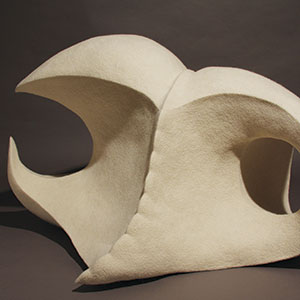

Is that a furry pig?” Someone asks the question aloud in a gallery at the San Jose Institute of Contemporary Art (ICA). They’re looking at a shelf of teddy bear skulls and the aforementioned piece, entitled Dedicated Meat Source, which does, in fact, resemble an off-white, forlorn and furry pig.
You can purchase similarly mesmerizing, desiccated oddities like these at San Francisco’s Paxton Gate or online at The Bone Room. But the skulls, pods and misshapen organic matter in Stephanie Metz’ exhibit “Figurative Fiber” are all made of wool. That colorless, neutral fabric neutralizes the Gothic qualities of skeletal figures.
“Skulls are not about death,” she says, explaining her take on skinless heads. “They’re about the underpinnings of life, what you can learn about something that’s been left behind.”
Seventeen years ago Metz stumbled across the art of needle felting. She studied sculpture at the University of Oregon, working with traditional materials like clay and bronze. Initially, she became intrigued by the alchemy involved in wet felting. But when she went to purchase the materials to try out the process, the woman behind the counter told her to try needle felting. She said it wasn’t as messy. Instead of shaping felt with warm water and your fingers, you use needles that have notch marks etched in their stems. When you stab at the wool, the notches push and rub the fibers together. The saleswoman had no idea what ambitious ideas her customer would later envision.
Metz demonstrated the needle felting technique to me in her San Jose studio, which looks like the classroom of the coolest teacher in school. On one shelf, there’s a progression of fetal-sized bears, from minuscule to tiny to small. And laying on every table or cabinet surface, there’s a giant “cocoon” resting on its side, in repose like Ingres’ famous Grand Odalisque. Metz hands me a loose ball of wool, takes it back and then stabs a pair of needles into it.
As she sculpts the fibers, they become more and more compact, taking the shape of whatever the artist is about to dream up. After she demonstrates the quick, repetitive motion, you can see how much effort it takes to transform strands of animal hair into obscure yet vaguely familiar shapes. In “Figurative Fiber,” Metz departs from realistic representation. Again, Dedicated Meat Source is a pig, but with a ridged back like an armadillo. It’s the suggestion of a pig, or a hybrid creature let loose from Dr. Moreau’s island. Large Flesh & Bone #2 and Flesh & Bone Study #3 aren’t creatures at all but parts of creatures.
Large Flesh & Bone #2 appears to be an excavated spinal section from a mythical beast. Flesh & Bone Study #3 might be an enormous gizzard or a distended, tumorous organ with bone spurs about to surface. One of these “blobby forms with a ridge of hair” comes from an intense study of how the fur grows together on her dog’s chest. “If you’re abstracting from the figure, you really need to know what it is you’re abstracting from,” she says. Metz begins with a basis in observable reality to decide what direction to take. In human and animal bodies, she notices where fat accumulates or where muscle attaches. She’s also aware of how varied our bodies can be. Her sculptures may look abstract, but she also appears to anticipate or account for our mutations.
The cocoons in her studio are works in progress for her upcoming show at the de Saisset Museum in January 2020. These pregnant pods range in length but are nearly human-size, between 5 and 6 feet tall. In comparison to what’s on display at the ICA, this is a notable change in scale. The new pieces will be hanging from the ceiling, and visitors will be encouraged to touch them. All of her woolen sculptures invite that reaction. You want to move in closer to see what everything is made of.
When she conceived of the new exhibit Metz asked herself, “When you look at the sculpture of a truncated body, if you’re not doing a whole form, where and why should it end?” They make visual sense because she’s shaped them into cohesive yet strangely botanical shapes. She borrows sensual forms from nature but weaves themholding instructive felting parties for extra pairs of helpful handsinto her own uniquely woolen language.
Stephanie Metz: Figurative Fiber
Thru Jun 9
San Jose Institute of Contemporary Art
sjica.org


